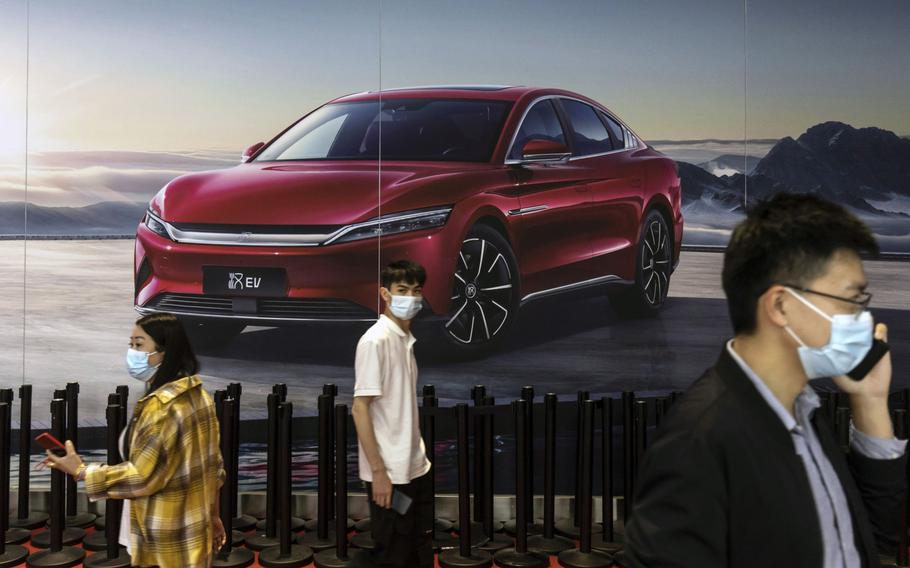
Visitors walk past an advertisement for the BYD Co. Han electric vehicle at the carmaker’s booth at the Auto Shanghai 2021 show in Shanghai, China, on Tuesday, April 27, 2021. (Qilai Shen/Bloomberg)
China's new technology overseer has outlined a sweeping blueprint to counter escalating U.S. sanctions and decoupling supply chains by developing homegrown expertise in areas such as electric vehicles.
In a lengthy column published by the Communist Party's main magazine, Minister for Industry and Information Technology Jin Zhuanglong called attention to how China occupies the lower and middle tiers of the global value chain and thus lacks the ability to master its fate.
It urgently needs to modernize and quicken development of critical technologies, and safeguard its ability to build everything from plastic toothbrushes to jumbo jets. That entails also staying ahead in sectors including new-energy vehicles, solar gear and mobile communications, where local players already enjoy an edge, Jin wrote. Companies like Huawei Technologies and EV maker Nio are among the leaders in their respective fields.
The article laid out China's thinking in greater detail than the minister has shared since his appointment less than a year ago. Notably, he didn't mention semiconductors, the industry at the heart of an accelerating conflict with the U.S. Washington is close to getting Japan and the Netherlands to curtail shipments to Chinese chipmakers such as Semiconductor Manufacturing International and Yangtze Memory Technologies, essentially capping their technological advance.
The move is regarded an attempt to sabotage China's rise and has spurred strong backlash from Beijing. At the same time, Xi Jinping's administration, incensed at the lack of progress in replacing sophisticated Western circuitry, detained several high-profile industry executives in a corruption crackdown around late 2022. Jin's predecessor Xiao Yaqing was himself removed following a separate anti-corruption probe.
Jin did stress several times the importance of shoring up "weak links" in China's supply chain — an expression typically used to describe China's reliance on foreign technologies such as chips, jet engines and software.
He warned in particular that fundamental shifts in a decoupling global supply chain have worsened the global macroeconomic environment. To counter that threat, Beijing can rely on a massive domestic market and its strengths in supply chain to stay competitive, he said without elaborating.
The minister's plan lacked specifics, as is customary of broad Party edicts. Lower-ranking agencies and bureaucrats often hammer out details after senior officials lay out their goals. Jin's comments echoed Xi's from just this week.
Here are a few key points from Jin's article:
• Technology independence is a must as China strives for economic growth and rejuvenation.
• China respects the traditional patterns of industrialization, but will focus on building the "new industrialization with Chinese characteristics."
• China still at mid, low-end of the value chain.
• Global supply chain now more competitive: developed countries want advanced manufacturing back; emerging markets want to be the next contract manufacturing hub. China's strength is its government's grasp of the economy, the world's most complete supply-chain ecosystem and a massive domestic market.
• U.S. tech curbs made the environment worse in recent years. China is determined to modernize the industry, keep a stable national strategy, solve near-term challenges while keeping an eye on long-term risks. The country will accelerate development of core technologies.
• Areas in which China has an edge: EVs, photovoltaic products, mobile telecoms, power grid gear.
• Key projects to push forward: mega passenger jets, industrial tools and machines, advanced medical and agricultural equipment, defense industry, 5G, data center and other IT infrastructure.
• Emerging technology trends to follow: next-gen communication, new energy, new material, biotech, green tech. Jin acknowledges the revolutionary power of the internet, big data, blockchain and artificial intelligence technologies.
• China to focus on solving supply chain safety issues, remove so called "weak links."
• The government will help a batch of leading companies to be more competitive globally.